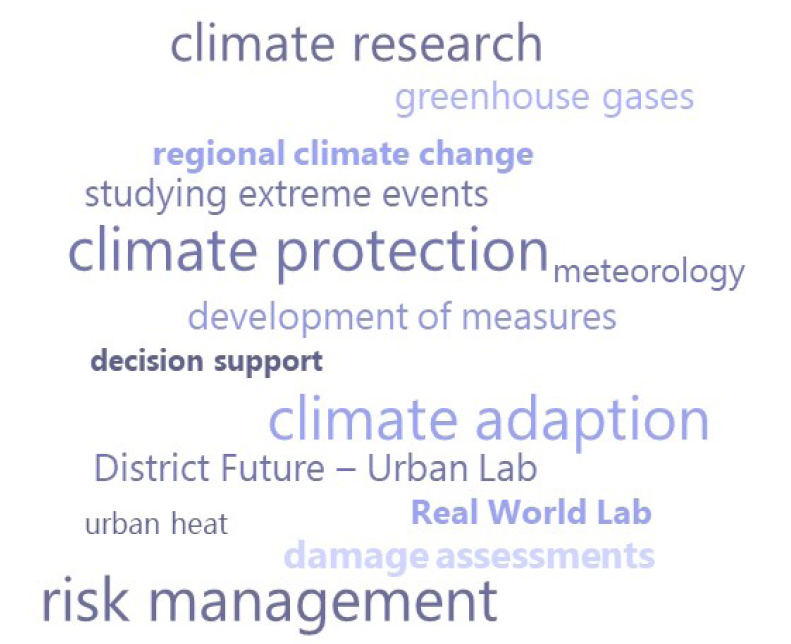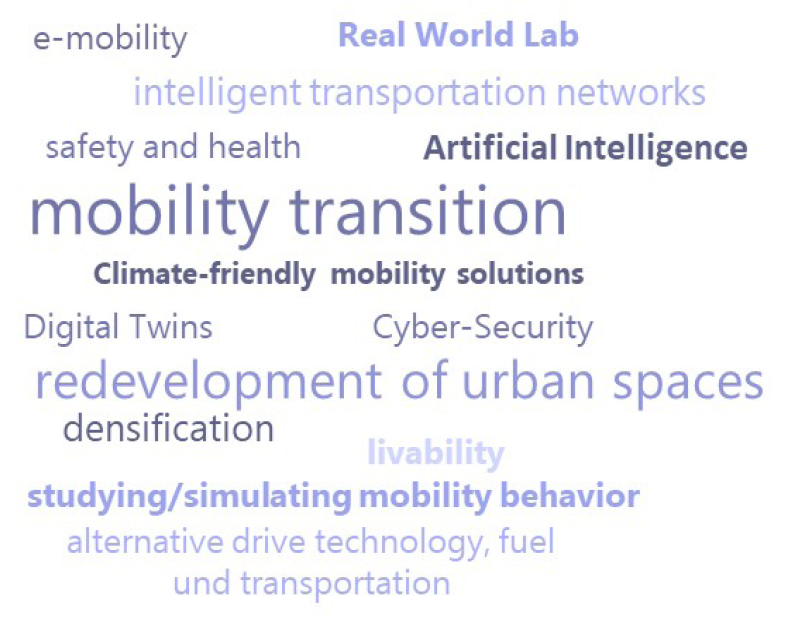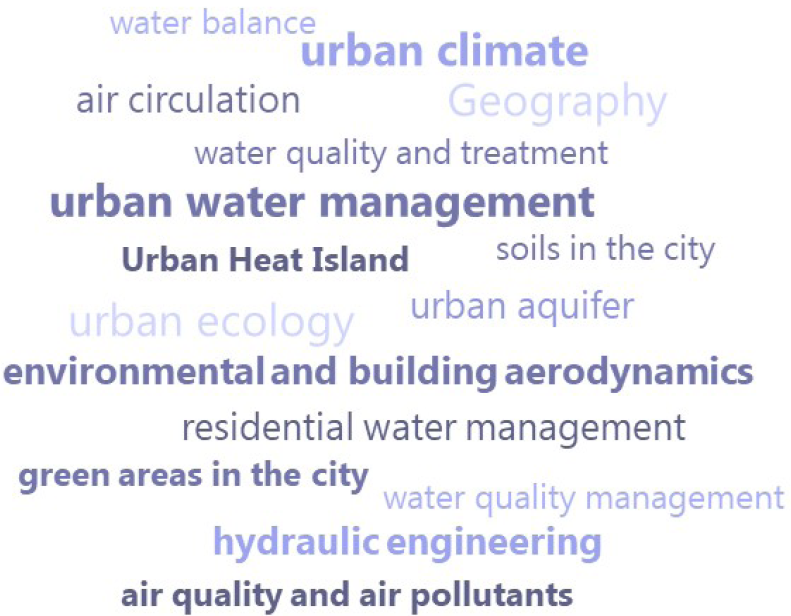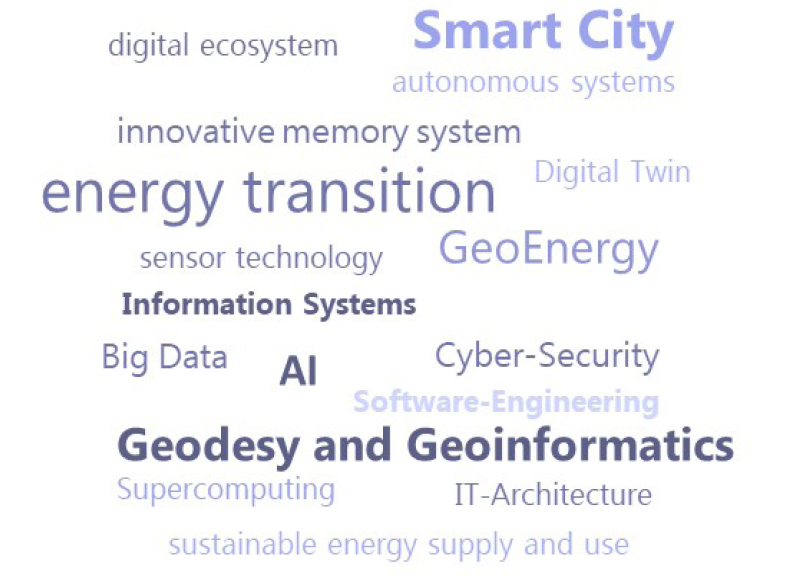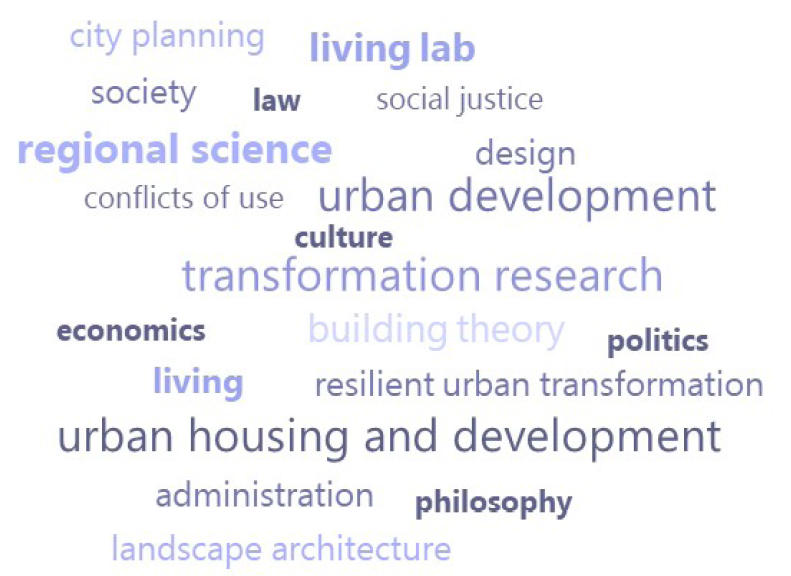Introduction
KIT contributes to the research, development, and planning of the city of the future in all essential aspects. Through a unique combination of expertise in natural sciences and engineering, social sciences, and humanities as well as planning and design, all functional and living areas of a city are investigated using a holistic approach. The KIT thus provides orientation and action knowledge for social actors and decision-makers at the local, regional, national, and international level.
The impacts of climate change are increasingly visible in many urban areas and communities. More frequent extreme events result in significant damage, intensifying the urban heat island effect through heatwaves and long periods of drought, affecting urban residents. Heavy rainfall leads to localised flooding, amplifying risks (risk research). Climate change projections of the coming decades as well as todays and future impacts are part of KIT climate and meteorology research. This information is crucial for developing strategies, concepts, and measures to prepare and adapt cities and municipalities to future climate conditions (climate adaptation).
On the other hand, since most of the world’s population is living in cities with an increasing trend and correlating high CO2 footprint, cities are major drivers of climate change. The ongoing mobility and energy transition of cities combined with a more climate-friendly consumer behaviour are therefore important steps towards stabilising the climate globally (climate protection). This topic area is closely linked to the topics of energy, mobility, water, and urban ecosystems.
The transport and mobility sector is currently responsible for around 20% of national CO2 emissions. The recently tightened climate protection targets call for a 45% reduction in greenhouse gas emissions from transport by 2030. At the same time, exhaust fumes from motor vehicles are a major contributor to inner-city air pollution. Achieving the sustainable and climate-friendly transformation of mobility is therefore a core task, considering holistic and sustainable solutions for resource scarcity, lack of space and an overloaded infrastructure, especially in cities. In addition to transitioning to alternative transport systems, the shift toward environmentally friendly modes of transport and the reduction of motorized traffic volume are integral to the mobility transition. This process, which is supported by the adoption of digital technologies, strongly influences the interaction with the design and use of urban space. One aim of KIT mobility research is therefore to develop forward-thinking, safe, sustainable, and convenient solutions for the mobility challenges of tomorrow. This involves supporting the mobility transition through testing in real-world settings (Real World Lab). The research conducted by KIT institutes is closely linked to the KIT Mobility Centre and the envisioned "German Centre for Future Mobility" in Karlsruhe.
Worldwide, steadily growing cities due to the high population migration cause a high demand for new constructions and related resources. The construction sector is a substantial material and waste-intensive sector. Despite a stable energy demand, CO2 emissions related to energy use in buildings and construction reached the highest level ever measured in 2019. Together with the production, transport, and use of building materials, they are responsible for 38% of global CO2 emissions. Resource-efficient and sustainable construction is essential for climate and environmental protection as well as sustainable resource consumption.
The KIT has long been renowned for its research and teaching expertise in the field of civil engineering and architecture, and today conducts intensive research into innovative further developments of traditional and new building materials and their combinations, into recycling and upcycling concepts for sustainable construction and the evolution of construction management. Particularly the realignment of the thematic areas Building Lifecycle Management, Sustainable Construction, Building Design Re-Use, and Digital Design and Fabrication, which has enabled a multitude of connections to other disciplines in research and teaching, is part of this relevant urban research field.
In addition to natural ecosystems, the city can be understood as an anthropogenic ecosystem characterised by a mosaic of buildings, streets, sealed surfaces, aboveground and underground infrastructure networks and unsealed green spaces. Urban water balance, ventilation, the urban radiation balance with a tendency to overheating and the entire ecology have changed accordingly. Changes in land use, e.g. due to densification, pollution, and natural disasters, alter or jeopardise this ecosystem. Other challenges include water management encompassing drinking water, grey and black water, precipitation, and waste disposal. These challenges are exacerbated by demographic changes, socio-cultural upheavals, and climate change.
This field of urban research at KIT focuses on scientific aspects such as urban climatology, the urban groundwater body, aerodynamics and ventilation, urban ecology, and botany. To improve the urban climate and ecosystem services, special attention is paid to blue-green urban infrastructures. A particular strength of KIT is its broad-based water research, which spans classical engineering subjects such as urban water management (Siedlungswasserwirtschaft), hydraulic engineering, issues of water quality and treatment, and the modification and geotechnical utilization of urban groundwater.
Energy supply, distribution, storage, and consumption in cities are key components of the transition to sustainability. Achieving emission-free and 100% renewable energy systems requires innovative and sustainable energy technologies, as well as social innovations related to consumption behaviour, awareness, and governance. Digitalization, i.e. the application and implementation of new information technologies, can enhance the efficiency of these processes and contribute to the development of a “smarter” city. As a strategic approach, digitalization can support not only the establishment of sustainable energy systems but also the overall transition to sustainability of cities. Research at KIT encompasses core topics and competencies in both energy and information technology, spanning from technological energy and smart city research to examining economic and psychological aspects of energy supply and consumption, adding geoinformatic and AI techniques. Additionally, it involves the implementation of these findings into urban planning and participatory processes.
Sustainable development of cities requires strong political and administrative support at both the urban and state levels, professional project management and openness/flexibility for new forms of collaborative governance based on a solid legal framework, multiscalar institutional relations, and innovative strategies including new forms of collaboration, communication, and engagement with society. Without such a shared perspective and the integration of administrative interests, long-term urban development cannot be successfully implemented. Important research areas therefore include adjustments to urban governance and planning mechanisms of cities, administrative organization in their structural and procedural performances, as well as collaboration between politics, administration, and civil society. Based on the unique combination of disciplines present at KIT, such as architecture, urban and spatial planning, (human) geography, sociology, media studies, (political) economies, and finance, empirical, cross-national comparative studies on various governance models are developed. Furthermore, new governance formats and planning strategies, including formal and informal planning instruments and rules at the local and regional level with citizen participation, are developed and tested.








